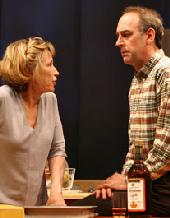SITE GUIDE
SEARCH
REVIEWS
FEATURES
NEWS
Etcetera and
Short Term Listings
LISTINGS
Broadway
Off-Broadway
NYC Restaurants
BOOKS and CDs
OTHER PLACES
Berkshires
London
California
New Jersey
DC
Philadelphia
Elsewhere
QUOTES
TKTS
PLAYWRIGHTS' ALBUMS
LETTERS TO EDITOR
FILM
LINKS
MISCELLANEOUS
Free Updates
Masthead
Writing for Us
A CurtainUp Review
The Butcher of Baraboo.
By Summer
Banks
| Chickens aren't so worried about narrative.
— Sevenly, on why it easier to cut to the good parts of a book when reading to chickens
|

Michael Countryman & Debra Jo Rupp in the Butcher of Baraboo.
(Photo: Joan Marcus) |
The aforementioned piece of cutlery is positioned prominently center stage, stuck rakishly into a carving block. What secrets does it know? What tales can be told by its dents? These are the questions that drive the plot of Marisa Wegrzyn's deliciously intriguing play, originally developed at the Steppenwolf Theater and now in its world premiere at Second Stage's uptown branch. Even though it looses its footing when it goes too over the top, The Butcher of Baraboo succeeds in wrapping the audience into small-town Wisconsin with its portrayals of the characters' lives that sidestep over moralistic preaching.
The cleaver's first victim is a bag of Starbucks free-trade organic coffee. From this halved bag of black coffee grains the play spills out around the lives of Valerie, the Baraboo town butcher, her daughter Midge and their relatives all trying to come to grips with the absence and assumed death of Valerie's husband Frank.
Valerie's sister-in-law Gail is a half competent police officer who's sure that the butcher and her cleaver had something to do with her brother's death. Occupied with his own wife and six children, Gail's brother Donal has just moved back to Baraboo from Provo. His naive wife Sevenly —thus named because she is the seventh of seven children—completes the quirky quintet with her own set of personal demons.
Over the course of the evening drug abuse, abortion, homosexuality and religion enter into the play's world, but no character is ever given a monologue expounding on the good or evilsor of any side. This is a welcome relief from other more pointedly political plays and a far more natural way to portray the issues that concern contemporary society. Past college, most of us don't pronounce long soliloquies of a philosophical nature on the issue of the moment. We live our lives, and only come to grips with an issue as it enters our lives. Sometimes there isn't even time to ponder the questions; you just have to act on instinct and move on. Baraboo is at its best when it follows this naturalistic pattern, focusing on the characters and their personal struggles with larger issues.
Director Judith Ivey has given her actors a realistic world in which to build their characters. They treat their house as if it were actually a house, and not a set on a stage.
Ashlie Atkinson as Midge is remarkably comfortable in her character. She repeats the same cereal routine (bend for the bowl and spoon, walk to the cereal, open the fridge for milk) multiple times, and each time with the same precision that comes from having lived that motion every day for years. The other actors are similarly realistic: Ali Marsh as Sevenly has mastered the art of being uncomfortably shy and Debra Jo Rupp as Valerie play ssilence like a fine musical instrument.
Ivey only begins to encounter difficulty at the end when the naturalistic buildup occasionally slips into theatrical hyperbole marked by beautiful, if not quite believable, stage pictures. The normally heightened realism is just barely overstepped but it's enough for the production to lose its emotional grip. Yet, for the most part, Baraboo does an admirable job of making a world eerily like our own live on stage.
The set (designed by Beowulf Borritt) is like a bizarre sitcom set in a vacuum with a typically plain Midwestern kitchen and dining room stripped of its walls and backed by folded and crinkled white fabric. This floating set reminds the audience that this play has larger implications than the typical television comedy. Dancing all over the fine line between sitcom and grand political drama, Baraboo explores the dramatic and comedic potential of the theater without losing the key ingredient that makes live theater so compelling: The actors on stage are real people, and this could easily be real life.
|
The Butcher of Baraboo By Marisa Wegrzyn Directed by Judith Ivey Cast: Ashlie Atkinson (Midge) Michael Countryman (Donel) Ali Marsh (Sevenly) Debra Jo Rupp (Valerie) Welker White (Gail) Set Design: Beowulf Boritt Costume Design: Andrea Lauer Lighting Design: Jeff Croiter Sound Design: Ryan Rumery Running Time: 2 hours includes one 10 minute intermission Second Stage Theatre Uptown at the McGinn/Cazale Theatre, 2162 Broadway at 76th St. 212.246.4422 www.2st.org From 5/24/07 to 6/30/07; opening 6/11/07 Tickets: $40.00; Youth Advance $20.00; Student Rush $10.00 Reviewed by Summer Banks based on 6/10/07 |

Easy-on-the budget super gift for yourself and your musical loving friends. Tons of gorgeous pictures.

Leonard Maltin's 2007 Movie Guide

At This Theater
Leonard Maltin's 2005 Movie Guide

 >
>

